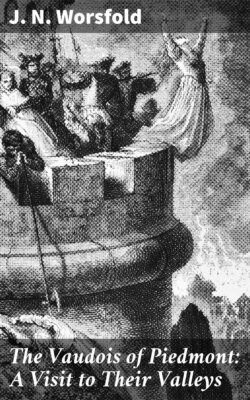Читать книгу The Vaudois of Piedmont: A Visit to Their Valleys - J. N. Worsfold - Страница 13
На сайте Литреса книга снята с продажи.
THE BEGINNING OF PAPAL PERSECUTIONS.
ОглавлениеTable of Contents
"We kept Thy faith 'gainst kings of might,
And potentates infernal;
We kept Thy faith in Rome's despite,
By help of grace supernal.
The foe was fierce, the war was long;
But oh! our helper was more strong,
Our lover was eternal."
During the struggles of the papacy for temporal aggrandizement and political usurpation, which marked its character from the seventh to the twelfth centuries, anything so religious as even the attempt to convert heretics by fire and sword seems little attended to. But in the twelfth century arose the epoch in which men were to be thrown into a burning fiery furnace who would not bow down to the tyranny of him who sat enthroned in the city of the seven hills. Otho IV., Emperor of Germany by favour of the pope, first gave his sanction to the persecution of the Waldenses, at the instigation of James, bishop of Turin, about the end of the 12th century.[C] But the first systematic persecution began under the regency exercised by Yolande, widow of Amadeus IX., Duke of Savoy, a.d. 1475. The expression (in her directions to the governors of Pinerolo, Cavour, and the magistrate at Lucerna), "It is our pleasure that the inhabitants of the valley of Lucerna especially may be able to enter into the bosom of the holy mother church," would seem to recognize the fact that the Vaudois were a community independent of Rome, otherwise we should expect the word return, which is so generally used in reference to heretics, as the Church of Rome delights to stigmatize all who reject her sway. This edict of Yolande led to the martyrdom of Vaudois pastors, some by fire, some by hanging, some in ways more revolting and excruciating, at Turin and other places. But the destruction of a few victims would not satisfy the malignant spirit of the papal antichrist, therefore the work of persecution must be organized on a larger scale. Innocent VIII. selected Albert de Capitaneis, Archdeacon of Cremona, as his agent for the accomplishment of this pious design.
